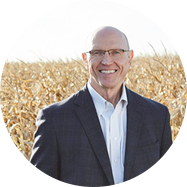When you are in sales your number one job is to sell.
Sell yourself first, your company second and your products third.
You are instructed and trained to make as many customer contacts as possible throughout the year to help increase sales.
While customer contact is the most important part of the job, there is another role that is often overlooked and hardly ever trained upon in the Seed Industry.
It’s called being a Psychologist with your growers.
Planting and Harvesting are the two biggest times of the year when sales reps need to take on this ever important role, especially when things are not going according to plan.
This difficult farm economy is increasing the need for many seed sellers to play psychologist and help growers stay positive.
Farmers are born and raised to produce a crop and when something interferes with that goal, they feel like caged lions wanting to break free and take control.
The companies I work with understand that they must teach their customers not to panic when something interferes with their plans, especially plans on producing the best crop possible and getting paid for it.
It has been documented for years that it is the summer and the fall that determines crop yields, not planting date. Record yields have been harvested whe n crops have been planted 5 – 6 weeks later than normal. As result, these companies also know they must visit everyone of their customers’ planters during the planting season.
n crops have been planted 5 – 6 weeks later than normal. As result, these companies also know they must visit everyone of their customers’ planters during the planting season.
The #1 reason is that many times sales reps have to talk a grower out of planting when conditions are not right. After all, Soil Conditions At Planting is the number one Factor To Producing A Top Crop.
We know that sales reps across the country are currently fielding calls from farmers asking questions about changing varieties or changing maturities of varieties, afraid that it is already getting late.
You must understand that there is still plenty of time to plant
There are no guarantees any year, regardless of how early or late a crop is planted. Even when neighbors may be trying to plant, it is important to be there to make sure your customers are not trying to mud it in.
Here are some words you may say if you find your grower trying to plant when conditions are really not right.
SeedSeller: “John, you know I have your best interest in mind don’t you.”
Grower: “Yes I believe that.”
SeedSeller: “John, if this was my field, I would pull out now and wait a couple of more days. Even one more day of sun will make a much better seed bed and will give you another 20 – 30 bushels of yield. That’s a fact. I know that is not what you want to hear and the decision is ultimately yours but I can promise you that you don’t want to follow your neighbor’s footsteps and mud this crop in. This crop is too important and we still have a plenty of time to get everything in. Plus, with that planter, it is only going to take you a few days to get the crop in once you get rolling. You still have at least 3 weeks before you would need to change anything.”
Grower: “Well, ok, I guess I will listen to you and give it a little more time.”
SeedSeller: “Great decision John, you will be happy you waited for conditions to get better.”
Being a Psychologist is not always easy but if you put yourself in the grower’s shoes by telling him if that was your field, this is what you would do, it feels much better to him.
It’s important to remember your job as a psychologist is to tell them what they need to hear and not necessarily what they want to hear.
Throughout these conversations, SeedSellers like you must keep growers’ attitudes positive, allowing them to make the right decisions, not rushed decisions.
This spring don’t forget your job as a psychologist is just as important as being a sales rep. Actually in the spring the two jobs go hand-in-hand just without the couch.
Rod
